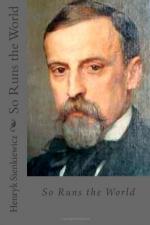But the human spirit, which does not slumber, and the organism that wishes to live, does not suffer excess of poison. Finally there came a moment for hiccoughs of disgust. Some voices began to rise asking for other spiritual bread; an instinctive sentiment awakes and cries that it cannot continue any longer in this way, that one must arise, shake off the mud, clean, change! The people ask for a fresh breeze. The masses cannot say what they want, but they know what they do not want; they know they are breathing bad air, and that they are suffocating. An uneasiness takes hold of their minds. Even in France they are seeking and crying for something different; they began to protest against the actual state of affairs. Many writers felt that uneasiness. They had some moments of doubt, about which I have spoken already, and those doubts were stronger on account of the uncertainty of the new roads. Look at the last books of Bourget, Rod, Barres, Desjardin, the poetry of Rimbaud, Verlaine, Heredia, Mallarme, and even Maeterlinck and his school. What do you find there? The searching for new essence and new form, feverish seeking for some issue, uncertainty where to go and where to look for help—in religion or mysticism, in duty outside of faith, or in patriotism or in humanity? Above all, however, one sees in them an immense uneasiness. They do not find any issue, because for it one needs two things: a great idea and a great talent, and they did not have either of them. Hence the uneasiness increases, and the same authors who arouse against rough pessimism of naturalistic direction fell into pessimism themselves, and by this the principal importance and aim of a reform became weaker. What remains then? The bizarre form. And in this bizarre form, whether it is called symbolism or impressionism, they go in deeper and become more entangled, losing artistic equilibrium, common sense, and serenity of the soul. Often they fall into the former corruption as far as the essence is concerned, and almost always into dissonance with one’s self, because they have an honest sentiment that they must give to the world something new, and they know not what.




